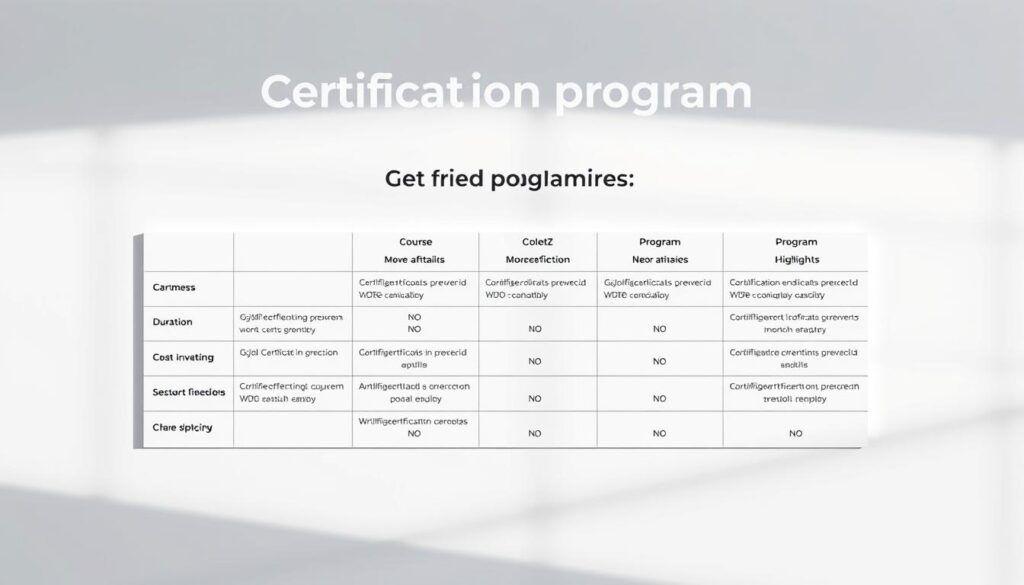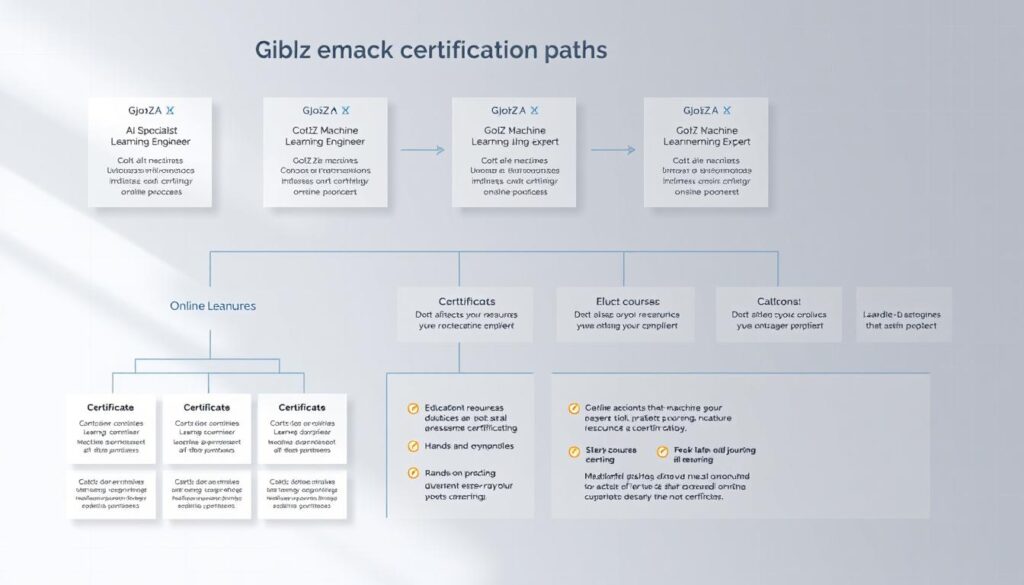
Affordable generative AI certification for career advancement
Did you know professionals with specialized credentials in emerging technologies earn 40% more on average than their peers? As industries rapidly adopt automation and data-driven solutions, mastering cutting-edge tools has become a non-negotiable advantage.
Credential programs focused on modern tech disciplines help bridge skill gaps while validating expertise. These programs combine theoretical foundations with hands-on practice, equipping learners to solve real-world challenges. Employers increasingly prioritize candidates who demonstrate updated competencies through recognized qualifications.
Continuous skill development remains critical in fields like machine intelligence, where best practices evolve quarterly. Structured learning paths enable professionals to stay ahead of industry shifts while expanding their technical capabilities. Practical training modules often mirror workplace scenarios, creating immediate applicability for new knowledge.
Key Takeaways
- Specialized credentials correlate with higher earning potential
- Practical skill validation strengthens job market competitiveness
- Ongoing education prevents skill obsolescence in tech fields
- Cost-effective programs deliver career-ready expertise
- Modern tools require regular competency updates
The Need for AI Certifications in Today’s Competitive Landscape
Over 75% of tech hiring managers now prioritize candidates with verified expertise in modern systems. As artificial intelligence reshapes industries from healthcare to finance, professionals must prove their ability to navigate these tools effectively.
Understanding the Role of AI in Career Growth
Mastering machine learning concepts creates opportunities across diverse fields. Banking analysts use predictive models to forecast trends. Marketing teams automate customer segmentation. These applications require workers to understand both theory and practice.
Structured programs teach core skills like neural networks and data preprocessing. This knowledge helps professionals adapt to new tools faster. A recent study showed certified individuals receive 2.3x more interview callbacks than peers without credentials.
How Certification Impacts Employability
Credentials act as third-party validation of technical abilities. Employers trust certifications from established platforms because they test real-world problem-solving. Vendor-neutral options demonstrate broad competence, while vendor-specific training targets niche roles.
| Certification Type | Focus Area | Industry Recognition |
|---|---|---|
| Vendor-Neutral | Foundational concepts | Cross-sector applicability |
| Vendor-Specific | Tool specialization | Platform-specific roles |
Specialized training bridges the gap between academic knowledge and workplace demands. Professionals who update their skills quarterly remain relevant in fast-moving sectors like robotics and natural language processing.
Overview of Generative AI and Its Market Impact
The global market for intelligent systems creating original content surpassed $15 billion in 2023. These tools analyze patterns in existing datasets to produce new text, images, and code. Unlike traditional systems focused on classification or prediction, this technology branch specializes in content generation through advanced pattern recognition.

Defining Generative AI Technologies
At its core, these systems rely on deep learning architectures like transformer models. Neural networks process massive datasets to identify relationships between elements. For example, large language models map word associations across millions of documents to predict coherent responses.
Business Applications and Emerging Use Cases
Industries now use these tools for rapid prototyping and personalized content creation. Retailers generate product descriptions at scale. Engineers automate 3D model iterations. A 2024 Gartner report shows 68% of enterprises using synthetic data for machine learning training.
Key sectors benefiting include:
- Healthcare: Accelerating drug discovery through molecular simulations
- Entertainment: Creating dynamic video game environments
- Manufacturing: Optimizing supply chain scenarios
Data-driven engineering teams report 45% faster project cycles when integrating these models. As adoption grows, professionals skilled in tuning these systems gain strategic advantages across technical roles.
Featured Certification Programs: A Product Roundup
Leading tech institutions now offer credentials that combine technical depth with practical skill-building. These programs differ in focus areas, training methods, and industry recognition. Let’s examine standout options for professionals seeking to validate their expertise.

Highlights from Top Vendors
IBM’s AI Engineering Professional Certificate teaches neural network design using TensorFlow and Keras. Key features:
- 6-month curriculum with Python programming labs
- Hands-on projects using Watson Studio
- $49/month subscription model
Google Cloud’s Machine Learning Engineer Path focuses on deploying models at scale. Participants gain experience with Vertex AI and BigQuery. The self-paced course costs $50/month and includes real-world case studies.
Comparative Analysis of Certification Offerings
| Vendor | Program Focus | Tools Used | Duration | Cost |
|---|---|---|---|---|
| MIT | Deep Learning Architectures | PyTorch, Jupyter | 12 Weeks | $3,500 |
| Stanford | Natural Language Processing | Hugging Face, SpaCy | 8 Weeks | $2,800 |
Shorter programs like Microsoft’s 6-week Azure AI Engineer course ($1,200) suit professionals needing rapid upskilling. Longer formats from universities often include mentorship and portfolio development.
Affordable generative AI certification for career advancement
Data scientists face growing pressure to master advanced tools while managing training budgets. Selecting the right program requires balancing cost, quality, and practical relevance. Industry leaders recommend focusing on curricula that blend foundational theory with applied exercises.

Three high-impact courses stand out for professionals seeking value-driven education:
| Course Name | Focus Area | Duration | Cost |
|---|---|---|---|
| Deep Learning Specialization (Coursera) | Neural network architectures | 4 months | $49/month |
| School of AI (Udacity) | Production-grade model deployment | 3 months | $399/month |
| MIT Applied ML (edX) | Real-world implementation | 10 weeks | $1,200 |
These programs emphasize industry-aligned practices, from data preprocessing to model optimization. Platforms like Kaggle and GitHub provide supplementary materials for hands-on experimentation. Learners report 72% faster skill application when combining structured courses with community resources.
Following established guides ensures alignment with employer expectations. Top-rated curricula often include capstone projects mirroring workplace challenges. Professionals should prioritize courses offering peer feedback and mentor support to accelerate mastery.
Use this comparison as a starting point for evaluating programs. Regularly updating technical skills through targeted learning remains critical in fast-evolving fields. Data scientists who align training with emerging tools position themselves for leadership roles.
Evaluating Costs, Duration, and Learning Paths
How do professionals choose between competing tech credentials? Smart selection requires analyzing three critical factors: financial investment, time allocation, and foundational knowledge. Programs vary widely in structure, making direct comparisons essential for optimal decision-making.

Cost Structures and Subscription Models
Training platforms use distinct pricing strategies. Subscription services like Coursera charge $49-$79 monthly, while universities often require one-time payments up to $3,500. Consider these options:
| Platform | Model | Average Cost |
|---|---|---|
| edX | One-time fee | $1,200-$2,500 |
| Udacity | Subscription | $399/month |
| LinkedIn Learning | Annual membership | $240/year |
Time Commitment and Course Length
Program durations range from intensive 4-week bootcamps to year-long specializations. Working professionals typically prefer:
- Self-paced modules (6-10 hours/week)
- Structured cohorts with deadlines
- Hybrid formats combining live and recorded sessions
Prerequisites and Skill Levels Required
Most quality programs demand basic Python skills and statistics understanding. Advanced tracks require experience with neural networks or language models. Stanford’s NLP course, for example, expects learners to demonstrate prior machine learning intelligence through coding challenges.
Effective learning paths build gradually from core concepts to complex language processing tasks. Look for curricula that balance theory with hands-on projects using real-world datasets. This approach ensures immediate workplace application of new skills.
Leveraging Certifications for Job Opportunities in the United States
The tech sector added over 300,000 AI-related roles last year, creating fierce competition for qualified candidates. Employers increasingly seek proof of technical proficiency through credentials that validate hands-on experience. Structured learning paths focusing on in-demand abilities like large language models now separate contenders from applicants.

Industry Trends and Employer Expectations
Hiring managers prioritize candidates who demonstrate expertise in emerging techniques like prompt engineering. A 2024 LinkedIn survey shows 83% of AI job postings require familiarity with transformer architectures. Professionals who complete specialized training report 67% faster promotion cycles compared to uncertified peers.
Success Stories and Case Studies
San Francisco-based software developer Maya Rodriguez doubled her salary after earning a credential in neural network optimization. “The certificate gave me concrete examples to discuss during interviews,” she explains. Another learner transitioned from data analysis to AI engineering roles by mastering tools like GPT-4 through guided projects.
Key strategies for career growth:
- Align training with employer tech stacks
- Showcase certification projects in portfolios
- Combine credentials with domain-specific knowledge
These examples prove targeted skill development creates measurable advantages. As automation reshapes industries, validated expertise remains the ultimate differentiator in U.S. job markets.
Balancing Vendor-Specific and Vendor-Neutral Options
Tech professionals often face a critical choice: mastering specialized tools versus building adaptable expertise. Vendor-neutral credentials emphasize universal programming principles, while vendor-specific training targets particular platforms. This decision impacts long-term career flexibility and immediate job prospects.

Why Broad Foundations Matter
Vendor-neutral programs teach core problem-solving skills applicable across systems. Learners gain:
- Portable expertise for global projects
- Understanding of cross-platform development patterns
- Ability to evaluate multiple products objectively
A LinkedIn study found 61% of hiring managers prefer candidates with vendor-neutral credentials for leadership roles. These certifications demonstrate adaptability in fast-changing markets.
Targeted Training for Immediate Needs
Vendor-specific paths prove valuable when:
| Situation | Example | Outcome |
|---|---|---|
| Standardized tech stacks | Azure-based enterprises | Faster onboarding |
| Niche product expertise | Salesforce developers | Higher starting salaries |
One engineering director notes: “Specialized credentials help teams implement solutions faster, but we promote architects with broader system knowledge.” Balance remains key – combine vendor-specific mastery with transferable skills for sustained career growth.
Emerging Trends in AI, Machine Learning, and Deep Learning
Recent breakthroughs in language processing are redefining how machines understand human intent. Platforms like Google Cloud now deploy systems that analyze context with unprecedented accuracy. This shift enables more intuitive interactions between users and technology.

Innovations in Large Language Models and NLP
Natural language processing tools now handle complex tasks like sentiment analysis and multilingual translation. Google Cloud recently unveiled new tools that streamline model training processes. These advancements allow:
- Real-time adaptation to regional dialects
- Automated summarization of technical documents
- Context-aware chatbots for customer service
One engineer noted: “Modern systems interpret sarcasm and idioms nearly as well as humans.” Such progress stems from architectures that process 500+ billion parameters – triple last year’s capacity.
Future Directions and Evolving Technologies
Researchers now focus on systems combining language models with visual data processing. Early prototypes generate 3D environments from text descriptions. Emerging areas include:
| Technology | Application | Impact |
|---|---|---|
| Multimodal AI | Medical diagnostics | Cross-referencing scans with patient histories |
| Self-improving models | Climate prediction | Real-time weather pattern adjustments |
Google Cloud’s roadmap hints at quantum computing integrations for faster model training. These developments suggest a future where machines anticipate needs before explicit commands – reshaping industries from education to urban planning.
How Can Affordable Digital Marketing Certificates Complement My Generative AI Certification for Career Advancement?
Combining a Generative AI certification with complementary skills can significantly enhance your career prospects. By focusing on areas like digital marketing, you can broaden your expertise. To start, it’s advisable to explore affordable digital marketing certificates for 2025, which allow you to integrate AI with effective marketing strategies.
Conclusion
The digital transformation wave demands more than basic technical skills—it requires proven expertise. Specialized credentials now serve as career accelerators, particularly in fields merging analytical rigor with creative problem-solving.
Choosing the right learning path helps professionals adapt to evolving business needs. For data scientists and technical teams, this means prioritizing programs that blend theoretical frameworks with real-world work scenarios. Hands-on projects often yield better results than theoretical study alone.
Three critical insights emerge from industry trends:
1. Continuous skill updates prevent knowledge gaps in fast-moving sectors
2. Strategic training aligns personal growth with organizational goals
3. Cross-functional competencies enhance leadership potential
Advancements in technology continue reshaping entire industries, making lifelong learning non-negotiable. Businesses now reward professionals who proactively master emerging tools through structured education.
The time to act is now. Begin exploring programs that match your professional trajectory while addressing current market demands. Your next career breakthrough might be one certification away.